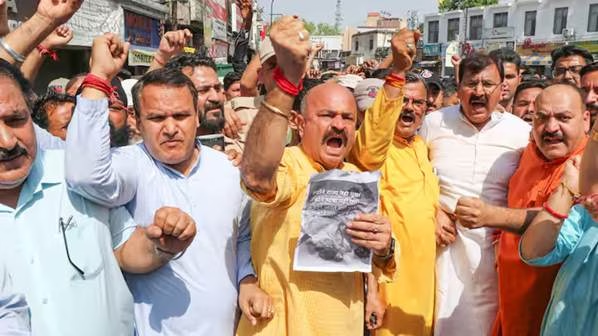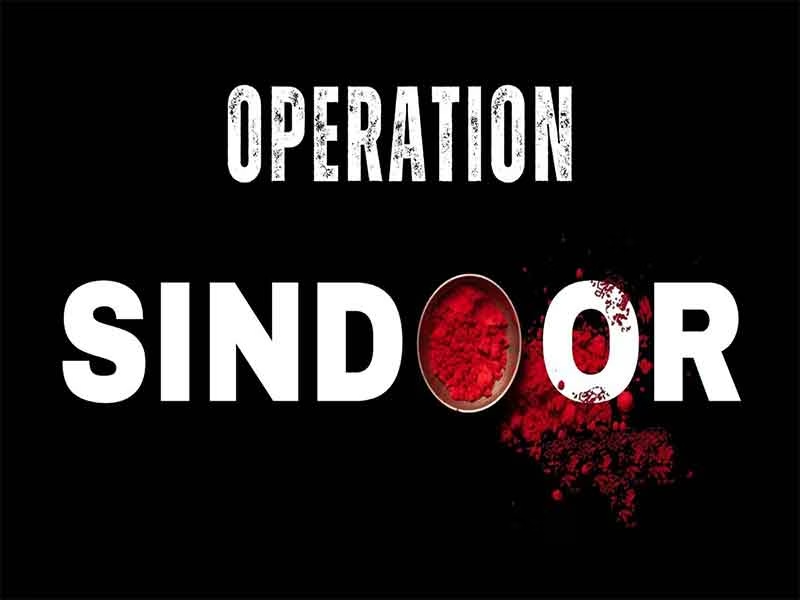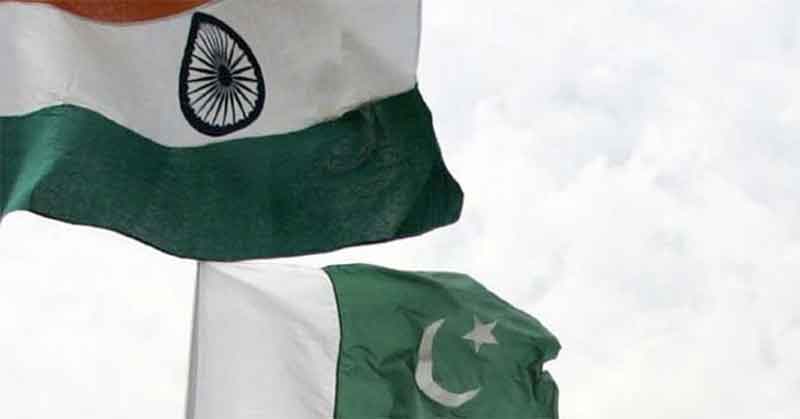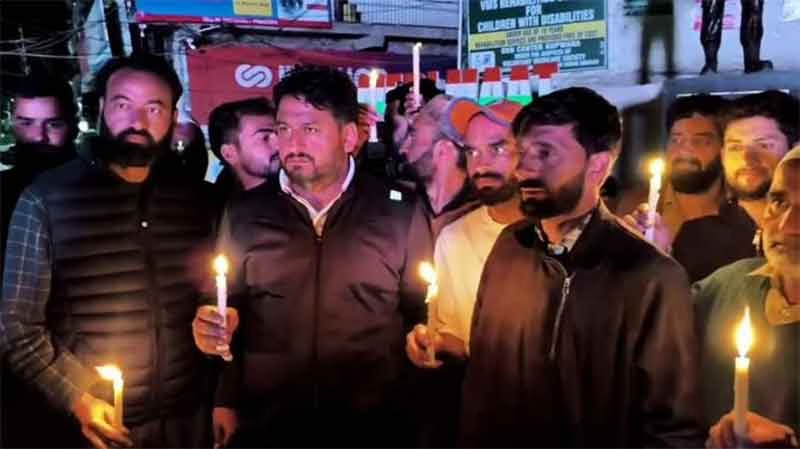
The Pahalgam protesters
On Tuesday, April 22, terrorists opened fire on the tourists in the Indian Kashmir’s popular tourist destination, Pahalgam.
Terrorists killed twenty-six, all men and all Indians except one Nepali and a Muslim, a tour helper.
As can be expected, the Pahalgam terrorist attack has shocked and angered the Indians and the world alike, more so because the killings were sectarian in nature and the killers murdered innocent souls who went to the pristine Pahalgam in search of peace and tranquillity and not death.
My heart joins all Indians, mourning the dead, and I pray for dead and the injured and conveying my sincerest condolences to the kith and kins who have lost their near and dear ones.
The media and Indian government have reported, that the ‘Resistance Front,’ a militant group believed to be linked to the Pakistan-based Lashkar-e-Taiba, has claimed the responsibility for the attack.
If I were an Indian and given the viciousness and seriousness of the crime, I would urge the government to leave no stone unturned to find the culprits, capture them, bring them to justice and give them exemplary punishment.
The most despicable aspect of Pahalgam carnage was that it had a sectarian character – Hindus were singled out and murdered. This is despicable.
At the same time, I would also ponder and remember the Kashmiri Muslim man, Syed Adil Hussain Shah, the tourist helper, who while trying to stop the attackers from murdering the tourists, became a victim of terrorism and was murdered, whose tale got buried “in the tornado of anti-Kashmiri and anti-Muslim hate.” This is both sad and unhealthy.
It has been reported that the terrorists asked for the names and religions of the victims before shooting them. Some of the tourists said that they were asked to recite the Islamic verse of kalima, so that the militants could segregate them by religion. This horrific and also a sad reminder that Muslims in India also undergo similar treatment at the hands of the Hindu vigilantes where they are asked to chant Jay Sri Ram and if the Muslims refuse, they are often subjected to physical assaults.
Thus, if I were an Indian, I would regard the Pahalgam incident as a reminder that criminals have no religion. Criminals are criminals. What separates the evil from the good is not the presence of but the absence of the core values of religion, all religions for all religions that value human lives and advocate mutual respect with diversity.
True that Pahalgam would go down as one of the brutal and ugliest acts of terrorism. But then, if I were an Indian and given that terrorism has no caste, colour nor religion, the very first question I would ask, and I would do so before I go into the analytic rigour of the backdrop of the carnage, – how is it that Pahalgam, a highly militarized and security risk area and a popular tourist destination was left unguarded and without surveillance, such that the lax conditions allowed the terrorists to enter the area and turn the tranquil Pahalgam into a killing field with ease and without any hindrance. The Indian government must be made to answer and be made accountable for this blatant security lapse.
Furthermore, if I were an Indian I would also be very concerned if the Indian government uses sectarianism to cover up its own failures and exploits mass anger to resort to measures that threaten and persecute further the persecuted, the Muslims and more particularly, the Kashmiri Muslims – this may assuage the mass anger but would do little to ensure long term peace and security of India.
One of the initial and visible responses of the Modi government to the Pahalgam carnage includes bulldozing houses of a few Kashmiris Muslims in Kashmir who are suspected of but no proof of having links with the terrorists. In other words, Modi government has chosen political opportunism and rage over restraint and pacification. The problem is that far from solving the problem, these extra-judicial actions may have worsened the feelings of powerlessness among the Kashmiri Muslims which is likely to foment more anger and not remorse, creasing the prospects of more and less violence in Kashmir in future.
The Pahalgam carnage has also entailed a huge and broader collateral damage to the safety and security of not just the Kashmiri Muslims inside Kashmir but of those who reside outside Kashmir, in various parts of India, where they live in fear. They anticipate mob justice as a retaliation, not just from the from the people on the streets, but from the government as well.
International dimension of the carnage and its spillover effects on India and Pakistan who are at daggers drawn at best of time should by no means be underestimated. Thus, sensing an imminent cross-border scuffle between the two nuclear neighbours around Pahalgam, the UN Secretary General has called upon both India and Pakistan to exercise “maximum restraint.”
However, it does not look like that Modi and his colleagues are paying much attention to the advice of the UN.
Modi government has since blamed Pakistan for the carnage, so far without any evidence, and has “announced a raft of measures…targeting Pakistan, including downgrading diplomatic ties, reducing staff at the Pakistani High Commission, expelling Pakistani diplomats, and closing its land border. It also suspended visa services for Pakistani nationals, advising Indian citizens in Pakistan to promptly return home, and suspended the Indus Waters Treaty, which allows the two countries to share the waters of the Indus River system.”
Although Pakistan has a long history of abetting Kashmiri militants, Pakistan government has categorically denied any involvement in the Pahalgam carnage and since responded to Modi government’s punitive measures against Pakistan especially the suspension Indus Water sharing treaty, the lifeblood to Pakistan’s irrigation and food security as “an act of war” by banning airspace to the Indian commercial and non-commercial flights that use Pakistan’s airspace to fly to the several Central Asian and European countries, a decision which would cost dearly the Indian airlines travelling to these destinations, in terms of “higher fuel costs and longer journey times.”
Let us hope that the tit-for-tat race between the two nuclear armed neighbours do not go out of control and end up in a bloodbath.
Surely, these are challenging time for India but if I were an Indian, I would also ask, not to justify the crime, but to get an answer to the question -whether or not these attacks such as Pahalgam are results of Indian state’s prolonged mistreatment of the Kashmiris majority of whom are Muslims and denial of right of self-determination, fomenting anger and intermittent violent reprisals.
As a matter of fact, Modi government’s revocation in 2019 of the Article 370 of the Indian constitution, – an article that once guaranteed Kashmir, full autonomy, – has since legally entitled the central government to suppress and repress the Kashmiris at will and with impunity, which according to Mr. Modi has been an antidote to the militancy in Kashmir but Pahalgam is a sad reminder that it has not.
Indeed, according to a political analyst, “Today’s India runs high on xenophobic propaganda and that has been unleashed for some years now; most of it is against Muslims,” such that “Kashmiris bear a double weight: of being a Kashmiri – and a Muslim…are always the easy targets.”
Thus, Modi government’s assumption that more control and more repression is the answer to the Kashmir problem and his claim that the revocation of Article 370 and suppression of rights of self-determination of the Kashmiris are good for peace and stability are dangerously misplaced.
Lately, I have been alarmed by some of the Pahalgam protesters who among many hateful festoons were also seen waving Israeli flags, giving the impression that they may be looking at Israel and its Gaza genocide, as a possible answer to the Kashmir problem, a “solution” that seeks total extermination of the original inhabitants of the land to the soil.
If I were an Indian I would be horrified that my fellow Indians are demanding genocide as a solution to the Kashmir problem.
Subscribe to Our Newsletter
Get the latest CounterCurrents updates delivered straight to your inbox.
In sum, if I were an Indian and as far as the Kashmir and more generally India’s Muslim issues are concerned, I would encourage the Indian government to choose dialogue over sabre-rattling and seek within the framework of a federated democratic India, solutions that promote an inclusive, fair and just India, solutions that do not divide but unite India, do not weaken but make India strong for the opposite – revenge – which seems to be dominant mood at the moment, is suicidal and risks India’s peace, prosperity and stability, for Confucius once reminded, “If you are planning revenge, dig two graves – one for the enemy and one for yourself.”
M Adil Khan is an academic and former senior policy manager of the UN.














































